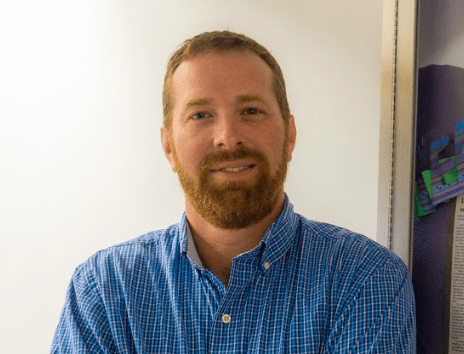Professor Josh Smith shares his passion of teaching with his students, and encourages careers in teaching for upcoming generations. Photo by Autumn Walter.
“It is a field that isn’t about the money you make or the hours you work. It’s about improving society and giving back to kids and at the end of the day, you feel like you did something that matters.”
Josh Smith, the current outcomes assessment and accreditation specialist at URI, lives by his words as he continues to work for the University of Rhode Island 15 years after becoming an alumnus. In his current position, Smith manages meeting requirements for accrediting the future teachers graduating from URI and utilizing applied research activities to help with student outcome assessment.
Smith grew up with a simple life in Rhode Island and became a first generation college student at the University of Massachusetts Dartmouth before transferring his sophomore year.
Starting as a history and political science major, Smith decided to go in a different direction and graduated with a master’s degree in secondary education in 2005. Right before graduating, Smith received an intriguing job offer from the University.
“The School of Education had a need for accreditation and there was a demand from the accrediting bodies that we have a person in charge of all Accreditation and Outcomes assessment,” said Smith. “Dr. Berg hired me on in 2004 on a grant and was able to turn it into hard money in 2005.”
Nearly every day, Smith works to meet accreditation requirements and help students receive teacher certifications through a wide variety of work.
“It is going to conferences,” Smith said. “It was meeting with the Rhode Island Department of Education and National Accreditation agencies and finding out the requirements that they mandated in order to be a nationally approved program.”
After settling into his career, Smith found time to pursue his passion for teaching with a fall course, called foundation of education.
“I like teaching and I always wanted to be a teacher,” Smith said. “I didn’t get to teach a lot when I was here working so in 2009 I started teaching EDC 102.”
Smith also serves as a program director of the Hawaii Exercise Physiology and Pedagogy winter program with his wife, Emily Clapham. Clapham graduated from URI and became the director of physical and health education, among other subjects in the Department of Kinesiology.
Smith’s experience with the accreditation process and Applied Research Activities gave him a preview of the future of education.
“It has been pretty consistent the 15 years I have been here where we have set standards and set activities like critical benchmark tests,” said Smith. “Education is starting to change now and we’ll see where that goes as far as competency based certification practices vs. traditional teacher preparation programs.”
Beyond noticing the smaller changes, Smith and other education specialists have found one problem.
“I know that there is a big teacher shortage coming,” said Smith. “With all the baby boomers retiring, we are going to have to come up with alternative ways to certify people who are qualified to teach because if we don’t then we aren’t going to have enough teachers to teach.”
The constant workflow of his position never stopped Smith from pursuing further studies.
“I decided to go back and get an MBA [Master of Business Administration] because I was more interested in making my job more efficient and being more practical,” Smith said.
Based on all the accreditation processes he works to maintain, Smith respects the incoming and graduating students studying education.
“The standards to become a teacher have gone up and up and up since I have been here,” Smith said.





